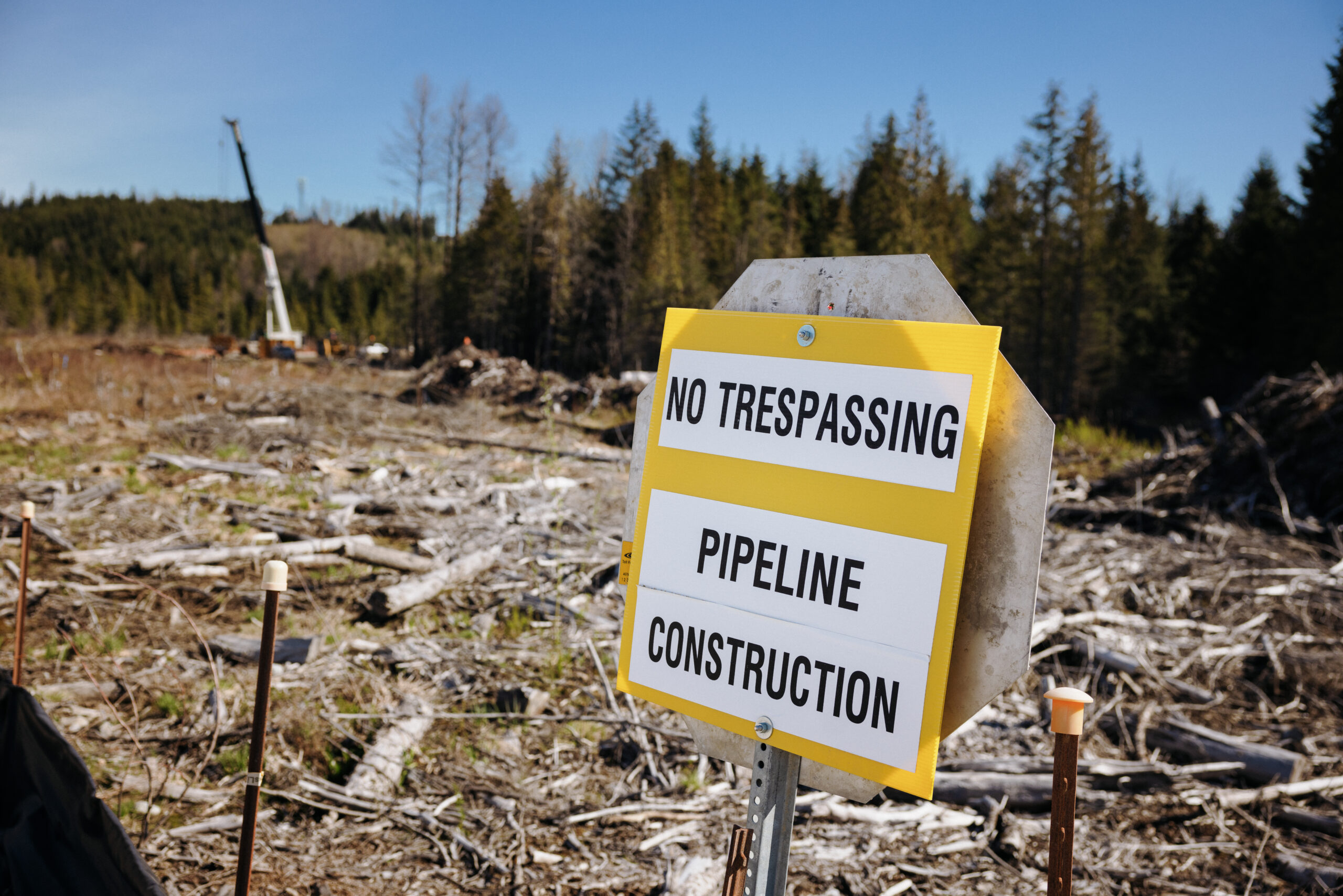
Will Canada’s next Prime Minister support Indigenous Rights and conservation projects?
The Conservative and Liberal parties diverge sharply on Indigenous issues. Here’s what that could mean...
B.C. Attorney General Niki Sharma has asked a provincial watchdog to look into a series of bold claims about how an executive at a Canadian oil and gas giant — and former BC NDP political staffer — claimed the company had leveraged political connections to persuade the provincial government to significantly weaken its environmental policies.
“We’ve been given opportunities to write entire briefing notes for ministers and premiers and prime ministers,” a TC Energy executive was recorded saying in a leaked tape from March 2024, adding that sometimes “overworked and underpaid” public servants “just want the job done for them.”
The executive in question is Liam Iliffe, a former senior advisor in the government of ex-premier John Horgan. Iliffe began lobbying for pipeline company TC Energy less than a year after leaving a senior strategic communications position in government, according to the pipeline company’s filings.
Iliffe and other TC Energy employees made numerous claims about how they had influenced the government during a “lunch and learn” session attended by about 150 people in March 2024.
The Narwhal reviewed about two hours of tape from the March call, as well as from a separate internal TC Energy call from February 2024, to report this story. During the course of this reporting, Iliffe informed The Narwhal on June 17 that he had resigned from the company.
“It would be remiss of me to suggest that anyone other than our elected representatives make decisions on behalf of British Columbians,” he wrote in an email. “I respect and treasure my relationships with past and present colleagues, partners and elected officials. Out of respect for those relationships, I have resigned effective immediately to avoid further distractions.”
The recordings included references to how the company has worked to shift the views of B.C. Premier David Eby, who said in October 2022 that it was not possible to continue expanding fossil-fuel infrastructure and still meet climate goals.

This week Eby released a video endorsing the Cedar LNG project as a “shining example of how natural resource development should work with our province, in full partnership with First Nations, in line with our commitments to fight climate change.”
“Every time I have heard Premier Eby speak about Cedar LNG, he has celebrated its commitment to be net zero by 2030 and one of the lowest-emissions facility of its kind in the world,” Eby’s spokesperson Jimmy Smith said in an emailed statement.
The premier’s new video was featured as part of an industry news release about how the Cedar LNG project in B.C. is moving ahead. The release also included endorsements from TC Energy, Prime Minister Justin Trudeau, other industry stakeholders and First Nations. Cedar LNG will receive its supply of natural gas from the Coastal GasLink pipeline, a TC Energy project.
“We’ve had some really remarkable results in terms of our message being repeated back to us by key decision-makers in government,” Iliffe said, during the leaked recording from March.

Iliffe also spoke on how TC Energy leverages relationships with ambassadors, Indigenous leaders and third parties as well as “influential bureaucrats” to support its lobbying for favourable changes to government policies, including the claim the company had the opportunity to draft entire briefing notes to be sent on government letterhead. The federal and provincial governments both denied the latter was true. Iliffe declined to go into specifics but told The Narwhal that not everything he told his colleagues during the March “lunch and learn” session was true.
In separate statements sent to The Narwhal, the B.C. government, TC Energy and Iliffe said the recordings included other claims that were not true, without identifying what those were.
In an emailed statement, Smith, Eby’s spokesperson, said “statements from Mr. Iliffe wherein he claims he has direct influence over government policy in any way are complete fabrications. For each ministry that Mr. Iliffe referred to in his comments or could have been in contact with him, senior political and public service staff were spoken to about these claims. No one could provide any evidence in support of his claims. Many provided examples of engagement with stakeholders at odds with Mr. Iliffe’s claims. Regardless, we have asked the registrar of lobbying to review the alleged conduct.”
Iliffe told The Narwhal he left his government position in May 2022, less than a year before David Eby succeeded Horgan as premier in the fall of 2022.
TC Energy filings with the provincial registrar of lobbying reveal that Iliffe was listed as a lobbyist as early as April 2023. However, the filings did not identify Iliffe as a former public office holder.
The filings indicate Iliffe lobbied various government officials 12 times, including at least five occasions in which he lobbied Premier Eby and his office directly, including a meeting involving TC Energy’s CEO, François Poirier. Illife lobbied the premier’s office as recently as May 29 of this year, more than two months after his March presentation.
Under B.C.’s Lobbying Transparency Act, former public office holders are required to identify themselves in their filings with the registrar.
“I am aware of the requirement, but TC Energy completed my registration on my behalf and I am only learning of the error today,” Iliffe told The Narwhal in an email.
TC Energy did not immediately respond to a question about whether it had made an error in its filings.
In some cases, former public servants also must avoid lobbying public officials for two years after leaving office, unless they get permission from the provincial registrar of lobbying. The registrar’s office declined to comment on whether it was investigating the matter.
Government officials were apparently unaware of TC Energy’s claims until prompted with questions sent by The Narwhal on June 13.
The government later shared a letter written by the B.C. attorney general with The Narwhal. The letter was sent by Sharma to the registrar of lobbying, Michael Harvey, on June 19.
“We understand a representative of TC Energy Corporation has made statements claiming TC Energy Corporation or its representatives significantly influenced Government of British Columbia decisions through their lobbying activities,” Sharma, the B.C. attorney general, wrote in her letter to the registrar of lobbying. “We have conducted an internal review and believe that these statements are untrue.”
Sharma said Iliffe’s claims could indicate “possible non-compliance with the Lobbyists Transparency Act.” She thanked Harvey for further looking into the matter.
Illife also described himself on the internal recording as a former chief of staff in Horgan’s office, but later told The Narwhal that he was a chief of staff to two ministers.
After this article was published, Smith, the spokesperson for Premier Eby, said Iliffe held six different positions in the provincial government between 2017 and 2022, working in two different advisory roles within the Ministry of Education, one role in the Ministry of Advanced Education and Skills Training as well as three other roles for a central government communications office. None of those positions were listed as a chief of staff, according to the premier’s office.
Iliffe later confirmed that the premier’s office had accurately listed his official former job titles, including as a senior ministerial assistant, but said that this title was equivalent to what is now known as a chief of staff.
One of Iliffe’s claims appeared to prompt laughter on the call as he discussed approaching a significant minister or bureaucrat he wanted to spend time with “next to the strawberries or the romaine lettuce” while at Costco.
“Some of the comments were made in the moment and the events and approaches I described did not actually occur,” he wrote in an email to The Narwhal.
When asked to comment on the recording, TC Energy initially told The Narwhal in a June 19 email that it had reviewed the presentation and comments made by a former employee, but the company did not elaborate on whether any of the comments were accurate.
“This individual is no longer with the company,” TC Energy said. “We apologize to the Government of British Columbia, Premier David Eby and all our partners, stakeholders and rightsholders for any impact on our valued, trusted and longstanding relationships.”

In response to follow-up questions, TC Energy provided a second statement on June 26 from its senior vice president of external relations, Patrick Muttart, that also said some statements on the call were untrue, without identifying which ones.
“We are disappointed recordings of internal [meetings], which included inaccurate comments from an employee that portray a false impression of how we do business, were released externally without authorization,” Muttart’s statement said.
As part of our reporting on this story, The Narwhal collaborated with the Guardian to verify whether the recordings were authentic, including an extensive review of lobbying filings and other public information.
The National Post also obtained a copy of the recordings and reported on them on June 26.
Updated June 26, 2024 at 3:51 p.m. PT: This article was updated to add additional statements from Liam Iliffe and Jimmy Smith about which roles Iliffe previously had in government.
Podcast: Download
Get the inside scoop on The Narwhal’s environment and climate reporting by signing up for our free newsletter. When I visited my reserve, Moose Factory,...
Continue reading
The Conservative and Liberal parties diverge sharply on Indigenous issues. Here’s what that could mean...

After a series of cuts to the once gold-standard legislation, the Doug Ford government is...

The BC Greens say secrecy around BC Energy Regulator compliance and enforcement is ‘completely unacceptable’

